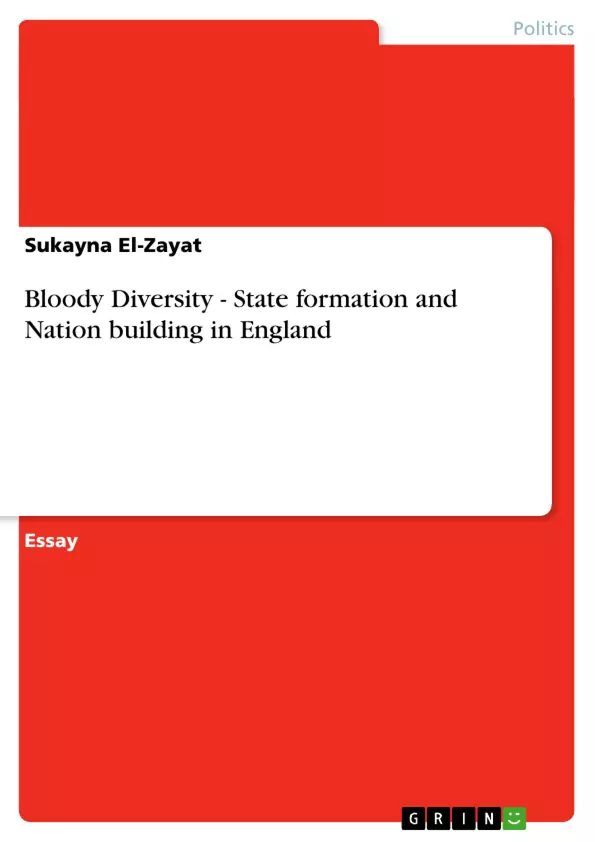This paper deals with the process of state formation and nation building in England from the high Middle Ages until the end of the nineteenth century. Furthermore, it discusses whether England had been first a state or a nation or if this process occurred concurrently. It aims to determine when, how and why these developments proceeded in England the way they did, and if England’s changes differed from the rest of Europe. This paper claims that in the case of England, state and nation building went hand in hand resulting in an early English nation-state. The rise of a national consciousness as well as the establishment of a sovereign state protecting individual rights would not have been possible without the early formation of parliament. Therefore, this paper argues that the evolvement of Parliament was essential and played a crucial role in shaping England into a nation state.
Inhaltsverzeichnis (Table of Contents)
- Introduction
- State formation
- Feudal England
- Concept of Sovereignty
- Struggle between kingdom and baronage
- Different shades of Absolutism
- Nation building and nationalism
- The idea of a nation state
- Liberalism and suffrage
- Conclusion
Zielsetzung und Themenschwerpunkte (Objectives and Key Themes)
This paper examines the process of state formation and nation building in England from the High Middle Ages until the end of the nineteenth century. It aims to determine when, how and why these developments proceeded in England and if they differed from other European nations. It argues that in England, state and nation building went hand in hand, resulting in an early English nation-state.
- The development of state formation and nation building in England
- The role of feudalism in English society
- The rise of Parliament and its impact on state sovereignty
- The significance of the English Protestant Reformation
- The relationship between state and nation in English history
Zusammenfassung der Kapitel (Chapter Summaries)
The introduction explores the historical context of England's development, highlighting the question of whether it was a state or a nation first, and argues for the concurrent development of both. The paper then delves into the feudal system in England, outlining its structure and its limitations in terms of state building. The concept of sovereignty is then discussed, examining how England moved towards a centralized authority through administrative reforms and the emergence of a legal system based on common law.
Schlüsselwörter (Keywords)
This paper focuses on the keywords state formation, nation building, feudalism, sovereignty, Parliament, English Protestant Reformation, and nation state. It explores these concepts in the context of English history, highlighting their interconnectedness and their impact on the development of a modern nation-state.
Frequently Asked Questions
Did England become a state or a nation first?
According to the research, state formation and nation building in England went hand in hand, developing concurrently into an early nation-state.
What role did Parliament play in English state building?
Parliament was essential for shaping the sovereign state and protecting individual rights, playing a crucial role in the rise of national consciousness.
How did feudalism affect England's development?
Feudalism structured early English society, but the struggle between the kingdom and the baronage eventually led to administrative reforms and centralized authority.
What was the impact of the English Protestant Reformation?
The Reformation was a significant factor in shaping the English national identity and strengthening the sovereignty of the state.
How did England's state formation differ from the rest of Europe?
England's development was characterized by an early integration of common law and the early emergence of a representative body (Parliament) compared to many continental nations.
- Arbeit zitieren
- Sukayna El-Zayat (Autor:in), 2012, Bloody Diversity - State formation and Nation building in England, München, GRIN Verlag, https://www.grin.com/document/206629



